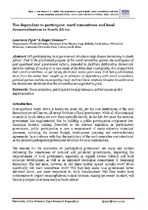| dc.contributor.author | Piper, Laurence | |
| dc.contributor.author | Deacon, Roger | |
| dc.date.accessioned | 2012-12-06T13:41:53Z | |
| dc.date.available | 2012-12-06T13:41:53Z | |
| dc.date.issued | 2009 | |
| dc.identifier.citation | Piper, L. & Deacon, R. (2009). Too dependent to participate: ward committees and local democratisation in South Africa. Local Government Studies, 35(4): 415-433 | en_US |
| dc.identifier.issn | 0300-3930 | |
| dc.identifier.issn | 1743-9388 | |
| dc.identifier.uri | http://hdl.handle.net/10566/483 | |
| dc.description.abstract | Will participatory local government structures help deepen democracy in
South Africa? That is the proclaimed purpose of the ward committee system, the centre-
piece of post-apartheid local government reform, intended to facilitate deliberative
democratic decision making. Drawing on a case study of the Msunduzi municipality, it
is argued here that ward committees, as yet barely functional seven years since first
being established, have from the outset been caught up in relations of dependency with
ward councillors, political parties and the municipality itself, and that these relations
threaten to undermine the democratic dividends that the committees are expected to
yield. | en_US |
| dc.language.iso | en | en_US |
| dc.publisher | Routledge | en_US |
| dc.rights | Copyright Routledge Journals, Taylor & Francis Ltd. This is the authors' final version and may be freely used provided that the source is acknowledged. | |
| dc.source.uri | http://dx.doi.org/10.1080/03003930902992683 | |
| dc.subject | Democratisation | en_US |
| dc.subject | Participatory local governance | en_US |
| dc.subject | Invited spaces | en_US |
| dc.subject | Policy implementation | en_US |
| dc.title | Too dependent to participate: ward committees and local democratisation in South Africa | en_US |
| dc.type | Article | en_US |
| dc.privacy.showsubmitter | false | |
| dc.status.ispeerreviewed | true | |
| dc.description.accreditation | Web of Science | en_US |

